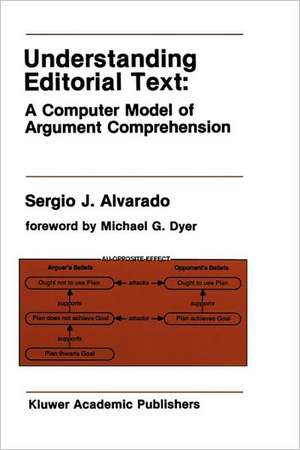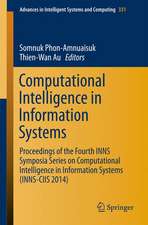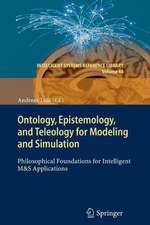Understanding Editorial Text: A Computer Model of Argument Comprehension: The Springer International Series in Engineering and Computer Science, cartea 107
Autor Sergio J. Alvaradoen Limba Engleză Hardback – 31 iul 1990
| Toate formatele și edițiile | Preț | Express |
|---|---|---|
| Paperback (1) | 988.48 lei 6-8 săpt. | |
| Springer Us – 26 sep 2011 | 988.48 lei 6-8 săpt. | |
| Hardback (1) | 994.92 lei 6-8 săpt. | |
| Springer Us – 31 iul 1990 | 994.92 lei 6-8 săpt. |
Din seria The Springer International Series in Engineering and Computer Science
- 24%
 Preț: 1041.98 lei
Preț: 1041.98 lei - 20%
 Preț: 643.50 lei
Preț: 643.50 lei - 18%
 Preț: 1225.62 lei
Preț: 1225.62 lei - 18%
 Preț: 965.02 lei
Preț: 965.02 lei - 20%
 Preț: 646.12 lei
Preț: 646.12 lei - 18%
 Preț: 948.79 lei
Preț: 948.79 lei - 20%
 Preț: 646.62 lei
Preț: 646.62 lei - 15%
 Preț: 637.46 lei
Preț: 637.46 lei - 20%
 Preț: 643.83 lei
Preț: 643.83 lei - 18%
 Preț: 949.23 lei
Preț: 949.23 lei - 20%
 Preț: 644.48 lei
Preț: 644.48 lei - 20%
 Preț: 645.97 lei
Preț: 645.97 lei - 18%
 Preț: 946.87 lei
Preț: 946.87 lei - 20%
 Preț: 995.57 lei
Preț: 995.57 lei - 18%
 Preț: 956.99 lei
Preț: 956.99 lei - 20%
 Preț: 644.98 lei
Preț: 644.98 lei - 15%
 Preț: 649.54 lei
Preț: 649.54 lei - 18%
 Preț: 950.21 lei
Preț: 950.21 lei - 18%
 Preț: 1221.38 lei
Preț: 1221.38 lei - 18%
 Preț: 957.62 lei
Preț: 957.62 lei - 15%
 Preț: 643.99 lei
Preț: 643.99 lei - 18%
 Preț: 948.47 lei
Preț: 948.47 lei - 18%
 Preț: 947.35 lei
Preț: 947.35 lei - 20%
 Preț: 1284.65 lei
Preț: 1284.65 lei - 20%
 Preț: 1628.31 lei
Preț: 1628.31 lei - 20%
 Preț: 1285.78 lei
Preț: 1285.78 lei
Preț: 994.92 lei
Preț vechi: 1243.64 lei
-20% Nou
Puncte Express: 1492
Preț estimativ în valută:
190.40€ • 206.75$ • 159.94£
190.40€ • 206.75$ • 159.94£
Carte tipărită la comandă
Livrare economică 23 aprilie-07 mai
Preluare comenzi: 021 569.72.76
Specificații
ISBN-13: 9780792391234
ISBN-10: 0792391233
Pagini: 296
Ilustrații: XXVIII, 296 p.
Dimensiuni: 155 x 235 x 19 mm
Greutate: 0.64 kg
Ediția:1990
Editura: Springer Us
Colecția Springer
Seria The Springer International Series in Engineering and Computer Science
Locul publicării:New York, NY, United States
ISBN-10: 0792391233
Pagini: 296
Ilustrații: XXVIII, 296 p.
Dimensiuni: 155 x 235 x 19 mm
Greutate: 0.64 kg
Ediția:1990
Editura: Springer Us
Colecția Springer
Seria The Springer International Series in Engineering and Computer Science
Locul publicării:New York, NY, United States
Public țintă
ResearchCuprins
1. The Nature of Argument Comprehension.- 1.1. Introduction.- 1.2. Argument Comprehension in OpEd.- 1.3. Scope of OpEd.- 1.4. Architecture of OpEd.- 1.5. Contents of the Dissertation.- 2. Representing Politico-Economic Knowledge.- 2.1. Introduction.- 2.2. Politico-Economic Conflicts.- 2.3. Politico-Economic Reasoning.- 2.4. Summary.- 3. Beliefs and Belief Relationships.- 3.1. Introduction.- 3.2. Belief Representation.- 3.3. Attack Relationships.- 3.4. Support Relationships.- 3.5. Summary.- 4. Argument Units.- 4.1. Introduction.- 4.2. Taxonomy of Argument Units.- 4.3. Representing Editorials With Configurations of Argument Units.- 4.4. Generality of Argument Units.- 4.5. Summary.- 5. Meta-Arguntellt Units.- 5.1. Introduction.- 5.2. Meta-Argument Units Based on Hypocritical Behavior.- 5.3. Meta-Argument Units Based on Unsound Reasoning.- 5.4. Summary.- 6. Recognizing Argument Structures.- 6. 1. Introduction.- 6.2. Recognizing Evaluative Beliefs From Explicit Standpoints.- 6.3. Recognizing Evaluative Beliefs From Emotional Reactions.- 6.4. Recognizing Causal Beliefs From Evaluative Beliefs.- 6.5. Recognizing Reasoning Scripts From Causal Beliefs.- 6.6. Recognizing Argument Units From Linguistic Constructs.- 6.7. Recognizing Argument Units From Plan-Failure Beliefs.- 6.8. Summary.- 7. Memory Search and Retrieval.- 7.1. Introduction.- 7.2. Organizing and Indexing Editorial Memory.- 7.3. Retrieving Information From Editorial Memory.- 7.4. Summary.- 8. Annotated Example of the OpEd System.- 8.1. Introduction.- 8.2. Editorial-Comprehension Trace.- 8.3. Question-Answering Traces.- 8.4. Current Status of OpEd.- 9. Future Work and Condusions.- 9.1. Introduction.- 9.2. Comparison With Other Work.- 9.3. Future Work.- 9.4. Summary and Conclusions.- References.

















